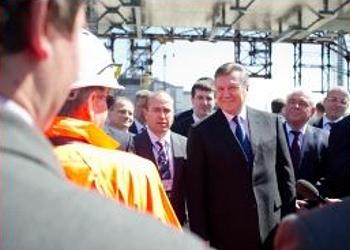
KIEV, Ukraine, April 26, 2013 (ENS) – On the 27th anniversary of the world’s worst nuclear disaster, Ukrainian President Viktor Yanukovych today laid flowers at the Memorial to Heroes at the Chernobyl nuclear power plant. He inspected the shelter being erected to contain the damaged reactor and ordered government officials to increase financial aid for Ukranians struggling with medical and social problems resulting from the accident.
“In memory of the great tragedy,” President Yanukovych called upon society to find solutions to the problems left by the explosion and fire that destroyed Unit 4 of the Chernobyl nuclear power plant on April 26, 1986.

“I require the government to find an opportunity to significantly increase state expenditures for social and medical protection of Ukrainians who suffered from the Chernobyl disaster,” President Yanukovych stressed while meeting today with the Chernobyl labor collective.
An area extending 30 kilometers (19 miles) in all directions from the plant was evacuated. The exclusion zone today is uninhabited, except for a few residents who have refused to leave.
The area has reverted to forest, but radiation levels are so high that the workers responsible for rebuilding the containment shelter over the damaged reactor are only allowed to work five hours a day for one month before taking 15 days of rest.
The workers told the President that the installation is 25 percent complete and will be finished at the end of 2015.
“Thank you for your work and courage,” said Yanukovych.
Ukrainian officials estimate the area will not be safe for human life for another 20,000 years.
The Chernobyl Shelter Fund was established at the G8 summit in 1997 to finance the construction of a 150 meter (492 foot) long containment shelter. The shelter is designed as a movable arch, constructed away from the shelter to avoid high radiation, to be slid over the sarcophagus. When completed, it will be the largest movable structure ever built.
The US$1.2 billion project is being managed by a consortium of Bechtel, Battelle, and Electricité de France.
Today, President Yanukovych expressed gratitude to European countries, the European Commission, European Bank of Reconstruction and Development, Russia, the United States, Canada and Japan for their active participation in the Chernobyl Shelter Fund.
On February 12, the Russian news agency Itar-Tass reported that the roof over Chernobyl nuclear plant’s Unit 4 partially collapsed because of a thick blanket of snow.
“There are no safety hazards. The radiation situation at the plant and in the exclusion zone is normal. No one was hurt,” the nuclear plant’s administration said then.
UN Secretary-General Ban Ki-moon today marked the anniversary by stressing that the impact of the Chernobyl disaster must never be forgotten. He called for continued international assistance for the people and regions affected.
“As we today mark 27 years after the Chernobyl disaster, we honor the emergency workers who risked their lives responding to the accident, the more than 330,000 people uprooted from their homes and the millions of people living in contaminated areas who have long been traumatized by lingering fears about their health and livelihoods,” said a statement issued by Ban’s spokesperson.
“The countless women, men and children affected by radioactive contamination must never be forgotten.”
In 2011, Ban became the first United Nations Secretary-General to visit the Chernobyl site, witnessing first hand the “great resilience” being demonstrated by the people affected by the 1986 explosion.
“The affected area is still suffering from the impact of the accident,” Ban said today. “Environmental damage to food chains, land and water will in many cases last for years. At the same time, we can take heart from the fact that communities there now have the chance and, increasingly, the means, to lead a normal life.”
Towards this end, the UN General Assembly proclaimed 2006-2016 a Decade of Recovery and Sustainable Development for the affected regions.
There is also a UN Action Plan on Chernobyl which contains a declaration of principles embraced by all UN agencies involved in recovery efforts and emphasizes social and economic development and the promotion of healthy lifestyles and community self-reliance.
Copyright Environment News Service (ENS) 2013. All rights reserved.
